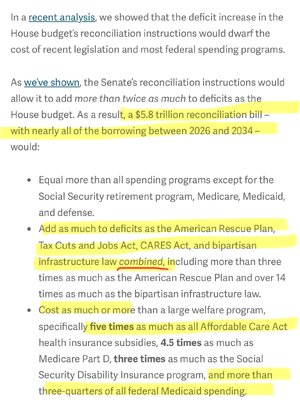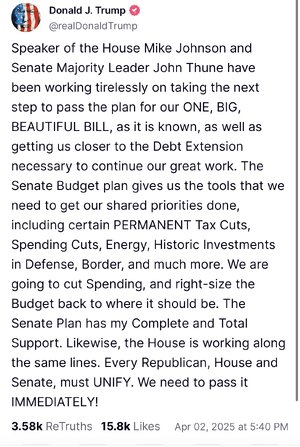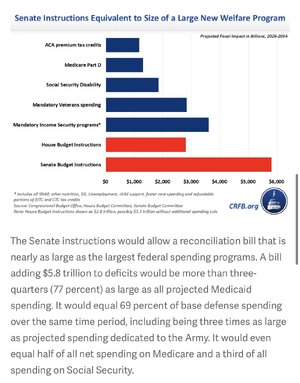Navigation
Install the app
How to install the app on iOS
Follow along with the video below to see how to install our site as a web app on your home screen.
Note: This feature may not be available in some browsers.
More options
You are using an out of date browser. It may not display this or other websites correctly.
You should upgrade or use an alternative browser.
You should upgrade or use an alternative browser.
U.S. Budget & OBBB | OCT 1 - Gov’t Shutdown Begins
- Thread starter nycfan
- Start date
- Replies: 2K
- Views: 72K
- Politics
How can Republicans be expected to grow a spine by the Democrat's example.?So tired of these Dems playing nice with these assholes.
So Senator Fetterman claims the government couldn't be shut down because there was no exit plan. Odd, because up until 24 hours before he flipped flopped it seemed Schumer had one. And if he didn't have one, then why didn't he call attention to this before the House voted?
Its not like they didn't have several months to figure out an exit plan.
Its not like they didn't have several months to figure out an exit plan.
- Messages
- 3,174
thisWhat does this mean? Maybe you think there is intellectual content there, but what I see is an empty platitude that could apply equally in any context.
Do you have any experience in law, politics, policy? That's not to say such experience is required, but maybe it's a good idea to have some basis for your angry pronouncements. What I see in your posts is little more than blue MAGA. There a lot of thoughtful people here, with deep experience in some of these fields, who seem to agree with the Schumer strategy. I was skeptical of it at first, and still do not know how I feel about it, but there are some serious questions to the "shut it down" argument and none of them have been meaningfully addressed.
The problem here is that "shut it down" is a bluff. We don't want it to shut down. When the GOP does their shutdown dance, they aren't bluffing. They don't care if it shuts down. And that's all the more true for Trump, who is dying for the chance to say "Congress didn't do its job; I will keep the government open."
This literally could be Trump's Reichstag moment. If you're not aware of that danger or disregard it, and instead go with meaningless rally slogans, you're not helping.
- Messages
- 29,589
‘Never been done’: Why Republicans might approve a budget whose numbers don’t match up
The planned House vs. Senate split sidesteps a thorny political problem but sets up a tricky path forward.“… Republican leaders are expected to embrace a novel strategy as they seek to push forward as soon as this coming week with their partisan package of tax cuts, border security enhancements, military spending and more. Rather than align House and Senate committees behind the same savings targets in the budget framework for that megabill, they want to set different numbers for each chamber.
The split screen could be stark, at least on paper. House committees will be asked to cut at least $2 trillion in spending from safety-net programs, while Senate committees might be directed to find a minimum of a few billion dollars in savings. It’s possible to write a final package that can bridge the difference, but it’s likely to be politically tricky — requiring trust between GOP lawmakers in the two chambers after months of cross-Capitol competition, along with substantial pressure from Trump. …”
- Messages
- 29,589
“… Here’s how it could work: The committee-by-committee targets embedded in the budget resolution are considered floors, not ceilings, for shrinking the federal deficit.‘Never been done’: Why Republicans might approve a budget whose numbers don’t match up
The planned House vs. Senate split sidesteps a thorny political problem but sets up a tricky path forward.
“… Republican leaders are expected to embrace a novel strategy as they seek to push forward as soon as this coming week with their partisan package of tax cuts, border security enhancements, military spending and more. Rather than align House and Senate committees behind the same savings targets in the budget framework for that megabill, they want to set different numbers for each chamber.
The split screen could be stark, at least on paper. House committees will be asked to cut at least $2 trillion in spending from safety-net programs, while Senate committees might be directed to find a minimum of a few billion dollars in savings. It’s possible to write a final package that can bridge the difference, but it’s likely to be politically tricky — requiring trust between GOP lawmakers in the two chambers after months of cross-Capitol competition, along with substantial pressure from Trump. …”
Those targets are also enforced differently in each chamber — the House can waive their own committees’ instructions with a simple majority, but the Senate will need 60 votes (and hence some Democrats) to allow their panels to depart from the blueprint.
That means the Senate needs much more flexibility at the front end of the process to avoid boxing themselves in and inadvertently disqualifying their own bill down the road. That is leading to the bare-bones instructions Senate GOP leaders are now considering. Notably, Republicans in each chamber need to unite now around overall year-by-year totals in their budget framework for federal revenue and budget deficits over the coming decade.
…
The “what” is complicated enough. The “why” is even more convoluted — and it’s all about the respective chambers’ politics.
The House’s $2 trillion minimum for spending cuts was driven by the demands of fiscal hawks, who conditioned their votes for their chamber’s budget blueprint earlier this month on the promise of seeing extreme spending cuts enacted in a final reconciliation bill. Of that total, $880 billion comes out of the House Energy and Commerce Committee, which could require lawmakers to make deep cuts to Medicaid.
Many GOP senators — and plenty of House Republicans, too — are wary about cutting too deeply into safety-net programs, and they aren’t united internally on where their spending cuts should come from.
The upshot is that if Senate Republicans end up approving a budget with far more modest targets than those in the House, the final reconciliation bill won’t necessarily have to adhere to the House’s $2 trillion overall target.
… “So the House’s version says: You must end up with something big,” Kogan continued. “And the Senate’s says: You can end up with something big. But if we can’t figure it out, we could end up with something small.” …”
- Messages
- 29,589
Senate Budget Could Enable Unprecedented Deficit Increase

Senate Budget Could Enable Unprecedented Deficit Increase | Committee for a Responsible Federal Budget
2025-04-04-The Senate’s proposed concurrent Fiscal Year (FY) 2025 budget resolution would allow policymakers to

- Messages
- 29,589
Republicans Advance Trump’s Tax Cuts After Late-Night Session
Senate GOP passes budget framework in early hours of Saturday
“… Lawmakers voted 51-48 early Saturday morning to adopt a fiscal framework for Trump’s tax reductions and proposed new spending on border security and the military. Sens. Rand Paul (R., Ky.) and Susan Collins (R., Maine) broke with their party to vote against the budget. Democrats, who opposed the measure, used the overnight session to try to force Republicans into politically uncomfortable votes on such issues as Medicaid, Social Security and tariffs.
… But the Senate plan defers important decisions about the depth of spending cuts, and Republicans must eventually hash them out in binding legislation. The framework postpones a reckoning in the tug of war between House conservatives who say spending cuts should be tied to tax cuts and Senate Republicans who are wary of how the House plans might harm rural hospitals and Medicaid beneficiaries. …”
——
The Senate GOP advanced the process but deferred the big decisions…
- Messages
- 29,589
The GOP has an Orwellian solution to pay for Trump’s tax cuts
Extending them will cost trillions of dollars? No problem.“… Republicans like to pretend they’re fiscal conservatives (at least some of the time). They would prefer not to acknowledge the hefty price tag, and they also don’t want to fully offset it with unpopular spending cuts.
So, they’ve devised a cheat. Rather than admitting how much their tax agenda would cost, they are simply asserting that they get their first $4 trillion — free!
Here’s how: Republicans say that because some (expiring) tax cuts have been in place since 2017, extending them shouldn’t be recorded as costing anything, because they wouldn’t feel different. This is … not how budgets work. As I’ve explained before, it’s like saying even though your car lease has ended, leasing another car should count as “free” because you got used to the convenience of having a vehicle around.
[Normally, the CBO and parliamentarian have a say in the validity of such claims. But the Senate GOP changed that. ]
…
Republicans have been trying to persuade the Senate parliamentarian to adopt their preferred math. So far, the parliamentarian has delayed making a ruling. But on Wednesday, Senate Budget Committee Chairman Lindsey Graham (R-South Carolina) announced the parliamentarian won’t ever need to decide. He plans to do what the party wants either way.
“I have the authority to determine baseline numbers for spending and revenue,” Graham said in a statement. Under that authority, he said, he can use the special book-cooking math — a “current policy baseline” — that grants his party $4 trillion in freebies.…”
superrific
Master of the ZZLverse
- Messages
- 10,827
JCTarheel82
Iconic Member
- Messages
- 1,803
In fairness, math is why we have national debt. If we could get rid of math, we could get rid of the national debt.Math is a tool of the Deep State.
HintonJamesHeel
Esteemed Member
- Messages
- 727

Trump told Republican senators he’s open to raising taxes on highest earners
The president’s private comments weren’t seen as full-throated support, but they could change the course of his party’s debate.
President Donald Trump told Republican senators in private last week that he’s open to raising tax rates on some of the highest-earning Americans, according to three people familiar with the meeting.
Trump’s comments came during a sitdown about his agenda with Senate Budget Committee Republicans and Majority Leader John Thune. After Sen. Lindsey Graham, R-S.C., asked Trump how he’d view a proposal to let taxes increase on the highest earners, the president replied that he’d be fine with that idea, the three people told Semafor.
Share:






